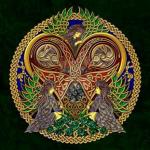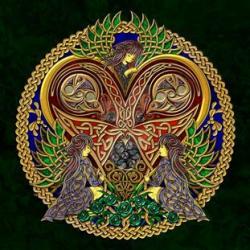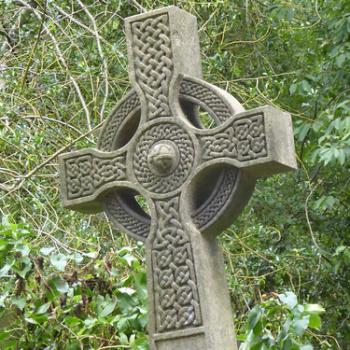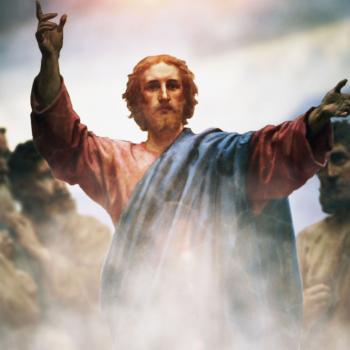 One of the common understandings in Celtic Christianity is the reality of an ever present God. In many Western churches today, worship is a way of inviting the Holy Spirit into a sacred place. The Celtic understanding of God would argue that God is already there and has always been there. The math of this concept checks out. If God is infinite, then there is no place where God cannot be. This simple understanding of God’s presence influenced how those in the Celtic faith interact with God. This is especially true in prayer and blessings.
One of the common understandings in Celtic Christianity is the reality of an ever present God. In many Western churches today, worship is a way of inviting the Holy Spirit into a sacred place. The Celtic understanding of God would argue that God is already there and has always been there. The math of this concept checks out. If God is infinite, then there is no place where God cannot be. This simple understanding of God’s presence influenced how those in the Celtic faith interact with God. This is especially true in prayer and blessings.
What is a Loom?
For those unfamiliar with weaving fabric its important to know what a loom is. A loom is the structure that one would use to give a weaved fabric structural support. The loom keeps tension on fabric as it is weaved into whatever the weaver is making. Its interesting to note that “Fruit of the Loom” does not grow on trees or vines, the fruit that the loom produces is weaved fabric. Hence the name on the tag of your undershirt!
The Loom Blessing (Carmina Gadelica pg. 305)
“In the Outer Isles women generally do the weaving, while in the Inner Isles and on the mainland it is usually done by men. In Uist, when the woman stops weaving on Saturday night she carefully ties up her loom and suspends the cross or crucifix above the sleay. This is for the purpose of keeping away the brownie, the banshee, the ‘peallan,’ and all evil spirits and malign influences from disarranging the thread and the loom. And all this is done with loving care and in good faith, and in prayer and purity of heart.”
After which the following blessing is recited;
BLESS, O Chief of generous chiefs,
My loom and everything a-near me,
Bless me in my every action,
Make Thou me safe while I live.
From every brownie and fairy woman,
From every evil wish and sorrow,
Help me, O Thou helping Being,
As long as I shall be in the land of the living.
In name of Mary, mild of deeds,
In name of Columba, just and potent,
Consecrate the four posts of my loom,
Till I begin on Monday.
Her pedals, her sleay, and her shuttle,
Her reeds, her warp, and her cogs,
Her cloth-beam, and her thread-beam,
Thrums and the thread of the plies.
Every web, black, white, and fair,
Roan, dun, checked, and red,
Give Thy blessing everywhere,
On every shuttle passing under the thread.
Thus will my loom be unharmed,
Till I shall arise on Monday;
Beauteous Mary will give me of her hove,
And there shall be no obstruction I shall not overcome.
Ancient Faith-Modern Hope
While protecting our work instruments from banshees and brownies may seem a bit mythical, there are things we can learn in the modern world from this blessing. The first is that God is present everywhere and within all things. From the cosmos to the loom, God is present. Recognizing this presence is key to a spiritual walk with our God. Second, understanding that the work of our hands and the tools we use are blessed by God. Although we are not worthy because of our work, our creative work is still important. Inviting God to bless our work and the tools that we need to accomplish this work is inviting God into the Mundane. Many times we forget that even in the most mundane of chores, we still can have communion with the God of the Universe.
The Names of God
Another amazing thing that sticks out to me in this blessing are two names used for God. Chief of Chiefs and Helping Being. In the modern era, many people would scoff at these names as unworthy for Jehovah God. However we must understand the culture to understand how endearing these names really are. In Scottish and Irish culture, Chiefs were regarded with awesome respect and awe. The Chief of Chiefs, sometimes referred to as “High King” was considered the ultimate title. For a rural Scottish woman in history to refer to anything as Chief of Chiefs was the equivalent of calling that thing God.
It is important to remember that just because a culture refers to God in a different manner than ourselves does not mean that it is inferior. Within context, Chief of Chiefs is the highest honor a being could have. And that it was bestowed on God says a lot about how revered God truly is within this culture. Our ways of doing things are not the best ways, just our ways. We must learn to understand that.
Secondly, the name Helping Being. The Celts viewed God as awesome in power, but also merciful. They viewed God as someone concerned with the plight of the most insignificant of the population. This is also how scripture describes God. Christ had immense concern for all and that scriptural lesson is shown through this blessing. That God would care about some woman in the Outer Isles of Scotland, or her work and tools shows a deep understanding. This shows a deep understanding as God as a personal God, one who is deeply concerned with us all, no matter standing, birthright or place of birth.
Lessons form the Outer Isles
Lesson One: God is ever present and does not need to wait for our call to be located in a place. God is in your church long before you begin to invite God through worship. It really is us who must learn to understand that reality and enter into a place where God already is. Buildings and functions cannot contain God. It is us who travel to meet God in a place.
Lesson Two: God is concerned with your day to day. God, who created you, is delighted with the things you create with your hands. From the fruit of the loom, to the field, to that power point spreadsheet you created for your boss. And since God delights in these things, we should always give our labor the best effort we can, for it is sacred.
Lesson Three: Rest is God ordained. From the Scottish Isles to the Garden of Eden, rest is not only honored by God, but required. We must allow ourselves to recharge. Rest is blessed by God
Lesson Four: We don’t have the market cornered on what is sacred. Our culture doesn’t get to decide if someone else’s worship style or understanding is worthy. We must learn to decolonize our views on what worship is. Worship can be dance, silent prayer, loud festivals or quiet Saturday blessings on tools. Intent is what makes worship sacred. We must learn to honor other ways of worship, when the intent is to honor God.











